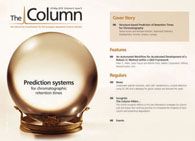Glycan Database
Ireland?s National Institute for Bioprocessing Research and Training (NIBRT) and Waters have announced a collaboration that will create the first database for glycan analysis by UPLC.
During the manufacture of biomolecules correct glycosylation is essential for the protein to achieve the correct structure and therapeutic efficacy. This process can be strongly influenced by many environmental factors during cell culture, such as dissolved oxygen, pH, carbon source and temperature. Given the number of possible glycan structures that can attach to a protein, it can be time-consuming to identify and quantify them all. This is why Ireland’s National Institute for Bioprocessing Research and Training (NIBRT) and Waters have announced a collaboration that will create the first database for glycan analysis by UPLC. Expected to be available in 2011, NIBRT will develop, maintain and license the database while Waters and NIBRT will co-market it worldwide.
“By combining our know-how in separations and glycan analysis with NIBRT’s expertise in glycobiology we can make fast and accurate glycosylation analysis a reality for the makers of biotherapeutics,” said Dr Jeff Mazzeo, director of biopharmaceutical business operations at Waters, in a statement. “Our goal is to simplify and introduce more certainty into the process of analyzing glycans and making quality biomolecules.”
For more information visit www.waters.com
This story originally appeared in The Column. Click here to view that issue.
Characterizing Plant Polysaccharides Using Size-Exclusion Chromatography
April 4th 2025With green chemistry becoming more standardized, Leena Pitkänen of Aalto University analyzed how useful size-exclusion chromatography (SEC) and asymmetric flow field-flow fractionation (AF4) could be in characterizing plant polysaccharides.
Investigating the Protective Effects of Frankincense Oil on Wound Healing with GC–MS
April 2nd 2025Frankincense essential oil is known for its anti-inflammatory, antioxidant, and therapeutic properties. A recent study investigated the protective effects of the oil in an excision wound model in rats, focusing on oxidative stress reduction, inflammatory cytokine modulation, and caspase-3 regulation; chemical composition of the oil was analyzed using gas chromatography–mass spectrometry (GC–MS).










